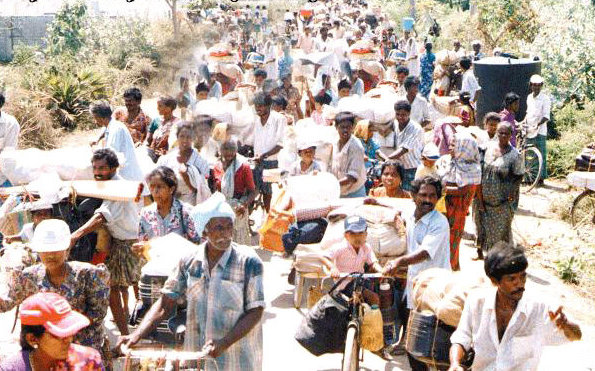Remembering the Jaffna exodus – 500,000 displaced

30 October 2020
On the day 25 years ago, over half a million Tamil men, women and children fled their homes in Jaffna as the Sri Lankan military launched a military offensive to capture the peninsula, under the leadership of then president Chandrika Kumaratunga.
On October 30, 1995, the entire town of Jaffna, the largest Tamil population centre on the island, streamed out in a mass exodus for the safety of the Vanni, which was then controlled by the Liberation Tigers of Tamil Eelam (LTTE).
Walking for several miles east, crossing the Navatkuli bridge, the throngs of people, carrying whatever they could manage, made their way to the neck of the Jaffna peninsula, before making the dangerous boat journey on to Kilinochchi.
.jpg)
.jpg)
On the tenth anniversary of the exodus, the Tamil Guardian wrote,
The exodus, as it came to be known amongst them, undeniably marked a turning point in Tamils’ self-understanding. The context in which the exodus took place was aptly summed by The Times of London, whose correspondent, Christopher Thomas, wrote on October 30: “Many civilians have been killed by government shelling and bombing, which has hit residential areas of the town. There is panic among the 600,000 Tamils on the Jaffna peninsula. The greatest humanitarian crisis of the war is in the making...Tamil civilians in Jaffna are evidently terrified by the advancing of the soldiers and are looking to the Tigers to save them from what they are convinced will be a massacre.”
Read the full piece here.
"The exodus was a colossal human tragedy, unprecedented in its proportions," wrote Adele Balasingham in 2003. "Heeding the appeal of the LTTE cadres and realising the imminent danger to their lives from the invading enemy troops, the entire population of Valigamam - more than five hundred thousand people - stepped out onto the roads carrying their bare essentials and dragging along their children, the elderly and the sick."
Read the extract from her book, ‘The Will to Freedom’, here.
.jpg)
‘The greatest humanitarian crisis of the war is in the making’
On 21 September 1995, as the Sri Lankan military prepared to launch its offensive, new emergency regulations were imposed, granting widespread censorship powers on all war-related reporting. All reports had to be run past a government-appointed Competent Authority for Censorship before publication.
Despite the censorship, UN Secretary General Boutros Boutros Ghali appealed for assistance, noting that up to 400,000 were fleeing.
“Reports of the massive displacement of the civilian population in northern Sri Lanka are a source of deep concern to the Secretary General,'' said spokesman Juan Carlos Brandt said in New York.
Christopher Thomas, correspondent for The Times, wrote on October 30:
“Many civilians have been killed by government shelling and bombing, which has hit residential areas of the town. There is panic among the 600,000 Tamils on the Jaffna peninsula. The greatest humanitarian crisis of the war is in the making...Tamil civilians in Jaffna are evidently terrified by the advancing of the soldiers and are looking to the Tigers to save them from what they are convinced will be a massacre.”
See more press coverage from the time here.
The fight for Jaffna
.jpg)
The all-out ground assault to recapture the Jaffna peninsula from the LTTE began on October 1. The first phase, ‘Operation Thunder,’ was intended to capture parts of Valikaamam region, to the north of Jaffna town.
The assault on Jaffna town itself, codenamed ‘Operation Riviresa’ (Sun Ray), began on October 17. Heavy fighting raged at several locations.
Read more on the Sri Lankan military offensive here.
The occupation continues

The Sri Lankan military continues to occupy large swathes of land in the region.
The defence ministry website reports that in 1996 the “SFHQ-J was founded as a Task force against illegal migration,” and "played a major role during humanitarian operations to eradicate terrorists from the Jaffna Peninsula.”
It continues to play a role in the “monitoring and surveillance of attempts on regrouping of terrorists,” it adds.
The Sri Lankan military now operates a tourist resort in the land it occupies, as well as being extensively involved in the running of civilian life across the homeland. To this day, many Tamils remain displaced.












